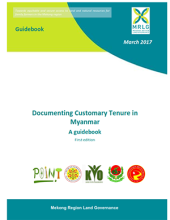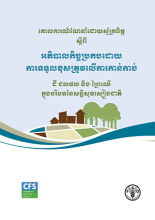Land Library Search
Through our robust search engine, you can search for any item of the over 73,000 highly curated resources in the Land Library.
If you would like to find an overview of what is possible, feel free to peruse the Search Guide.
/ library resources
Showing items 1 through 9 of 11.This guidebook provides conceptual, legal and practical tools and resources to help civil society organizations guide communities through the process of documenting customary tenure at the local level.
FAO published its Voluntary Guidelines on the Responsible Governance of Tenure (VGGT) of Land, Fisheries and Forests in the Context of National Food Security in 2012.
Less than 2% of the land available worldwide is owned by women. Why is the issue of land so gendered? What approaches and lessons learned can development professionals utilise to address the issue of gender and land?
Climate change is increasingly being recognised as a global crisis, but responses to it have so far been overly focused on scientific and economic solutions. How then do we move towards morepeople-centred, gender-aware climate change policies and processes?
The Women Advancement Trust (WAT) in Tanzania carries out various initiatives related to land rights, affordable housing, and inheritance rights. This report presents lessons learned from a housing and shelter development initiative.
The renovation process in Vietnam in the past decade has enabled significant economic growth as well as and greater rights and more important economic roles of farming households.
This shadow report, led by The Latin American and Caribbean Committee for the Defense of Women's Rights -Peru (CLADEM-Peru), contributes to the United Nations Committee that monitors the implementation of the Convention on the Elimination of All Forms of Discrimination Against Women (CEDAW).
What evidence is there of gender inequalities in life outcomes between women and men? This report provides facts and figures that expose gender inequalities, providing evidence of the need to engender development.
What can development cooperation do to improve gender-responsiveness of land tenure development' Central to this objective is the mainstreaming of gender considerations into all areas (macro, meso and micro levels) of development cooperation which influence access to, control over, and benefits f



